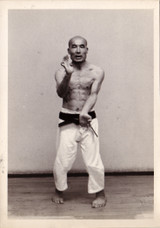Sogen Sakiyama Roshi

Sogen Sakiyama Roshi 1921
“Zen Monk - Karate
Master”
Sogen Sakiyama is now a Zen Priest and one of the highest in all of Japan. Roshi as he is affectionately called is one of the few still alive that trained with Master Miyagi. He trained directly with Miyagi for approximately 12 years while still a young boy, and learned all the forms from the beginning to end. His favorite forms were Sanchin, Tensho and Seiunchin.
He is often quoted as saying that Miyagi’s breathing methods were meaningful and he has carried these over into his study of Zen. Miyagi encouraged him and inspired him to begin his study of Zen in 1949. He continues to practice his Zen in his Temple near Shuri Castle, Naha, Okinawa. On occasion, if a karate group visits he will lecture on karate and Zen recapping stories of Master Miyagi. Roshi lived in New York for two years, and speaks fluent English.
Roshi was asked how he reconciles Zen Buddhist compassion with the practice of Karate-do, which is sometimes violent, and how one reconciles the killing Samurai with Zen. He responded in part that one can struggle to save life, as well as to destroy it. When you fight, you must know why you are fighting your enemy. If you fight only to overcome your enemy you are just like a fighting dog; when you fight to ‘go beyond’ it’s different. There is a sword which gives life and one which takes it. In the practice of Karate, there is a kind of ‘practical Karate’, where you only train for fighting and self defence. Then there is a kind of real Karate that combines both practice and oral tradition.
 Roshi
revealed that Sensei Chojun Miyagi likely practiced Zazen since he attached the
greatest importance to the mental and spiritual features of his art, and
exercised his mind constantly.
Roshi
revealed that Sensei Chojun Miyagi likely practiced Zazen since he attached the
greatest importance to the mental and spiritual features of his art, and
exercised his mind constantly.
Roshi noted that zen meditation offers the perfect balance for martial arts students –quiet, internal training of the mind to compliment the hard, physical training of the body – yet another beautiful metaphor for go and ju!
Master Roshi is dedicated to Zazen. He provides a clear and compelling argument on the link with Karate and the martial artist in the search for knowledge of self.
